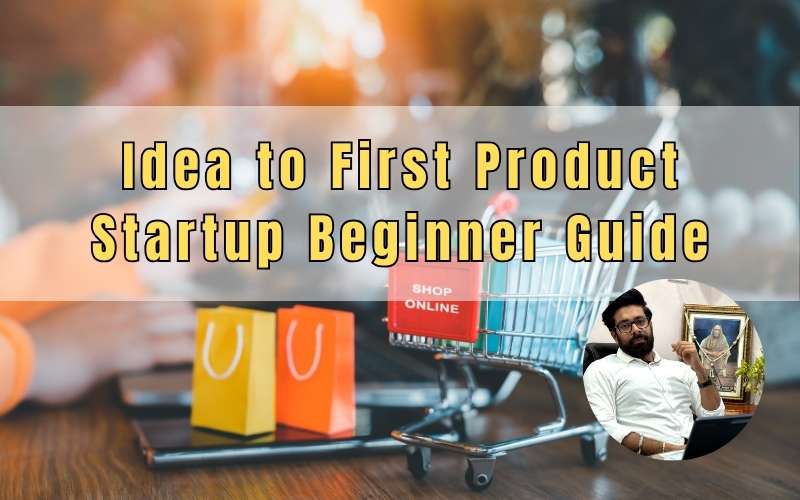Introduction: Who is Prince Khanuja?
Setting off on the journey of turning an idea into a successful startup is both thrilling and challenging. In the realm of entrepreneurship, individuals like Prince Khanuja serve as inspirations for budding Startup Beginner enthusiasts. Prince Khanuja, an experienced entrepreneur and startup beginner mentor, is renowned for his expertise in guiding aspiring founders through the intricate process of building and launching their first product.
Understanding the Concept: From Idea to First Product
What is a Startup Beginner?
A startup is a budding company founded by one or more entrepreneurs to develop and commercialize innovative products or services. Unlike established businesses, startups often operate in dynamic and uncertain environments, aiming to disrupt existing markets or create entirely new ones.
The journey from idea to product involves transforming a concept or innovation into a tangible offering that addresses a specific need or problem in the market.
Identifying Your Idea
Finding inspiration
The initial step in launching a startup is identifying a compelling idea or opportunity. Inspiration can be drawn from various sources, including personal experiences, industry trends, or gaps in the market.
Validating your idea
Before investing time and resources into developing your idea, it’s crucial to validate its viability. This involves conducting market research, gathering feedback from potential customers, and assessing the demand for your proposed solution.
Market Research: Finding Your Niche
Understanding your target audience
Successful startups understand the needs, preferences, and pain points of their target audience. Conduct thorough market research to gain insights into your potential customers’ demographics, behaviors, and preferences.
Analyzing competitors
Competitive analysis is essential for identifying gaps in the market and positioning your Startup Beginner effectively. Study your competitors’ strengths, weaknesses, and strategies to differentiate your offering and capitalize on market opportunities.
Building Your Team: The Importance of Collaboration
Finding co-founders or team members
Building a robust team is crucial for the success of your startup. Look for co-founders or team members who complement your skills and share your vision for the venture.
Building a diverse team
Diversity in thought, background, and expertise can foster innovation and creativity within your startup. Embrace diversity when assembling your team to bring fresh perspectives and insights to the table.
Creating a Business Plan
Defining your mission and vision
A clear mission and vision provide a roadmap for your startup’s growth and development. Define your purpose, values, and long-term goals to guide strategic decision-making.
Setting SMART goals
SMART (Specific, Measurable, Achievable, Relevant, Time-bound) goals help translate your vision into actionable objectives. Establish concrete goals and milestones to track progress and measure success.
Prototyping and MVP Development
Developing a minimum viable product (MVP)
An MVP is a scaled-down version of your product that allows you to test key hypotheses and gather feedback from early adopters. Focus on building essential features that address the core needs of your target audience.
Iterative prototyping
Iterative prototyping involves refining and improving your product based on user feedback and testing. Continuously iterate on your MVP to enhance its functionality, usability, and value proposition.
Funding Your Startup Beginner
Bootstrapping
Involves funding your startup using personal savings, revenue from early customers, or other non-traditional sources. Bootstrapping allows you to retain full control over your venture but may limit your growth potential.
Seeking investors
For startups requiring additional capital to scale, seeking investment from angel investors, venture capitalists, or crowdfunding platforms can provide the necessary funds for growth. Prepare a compelling pitch and business plan to attract potential investors.
Building Your Brand
Crafting a unique value proposition
Your value proposition communicates the unique benefits and value your product offers to customers. Craft a compelling value proposition that resonates with your target audience and sets your startup apart from competitors.
Creating a brand identity
A strong brand identity helps differentiate your startup in the market and build trust with customers. Develop a cohesive brand identity that reflects your startup’s personality, values, and mission.
Marketing and Launch Strategy
Digital marketing tactics
Digital marketing offers cost-effective strategies for reaching and engaging your target audience. Utilize tactics such as content marketing, social media, email marketing, and search engine optimization (SEO) to build awareness and drive traffic to your product.
Preparing for launch
Launching your startup requires careful planning and execution. Develop a comprehensive launch strategy that includes promotional activities, media outreach, and customer acquisition tactics to generate buzz and attract early adopters.
Customer Feedback and Iteration
Listening to customer feedback
Customer feedback is invaluable for refining your product and meeting the evolving needs of your target audience. Actively seek feedback from users and incorporate their insights into product development and iteration.
Continuous improvement
Startup success relies on continuous learning and improvement. Embrace a culture of experimentation and iteration, continually refining your product, marketing strategies, and business processes based on feedback and insights.
Scaling Your Startup
Scaling challenges and opportunities
As your startup grows, you’ll encounter new challenges and opportunities. Anticipate scaling challenges such as hiring talent, scaling operations, and maintaining product quality while capitalizing on opportunities for expansion and growth.
Expanding your team and operations
Scaling requires expanding your team and operations to support increased demand and growth. Hire talented individuals who align with your startup’s culture and values and invest in scalable processes and infrastructure to support growth.
Overcoming Challenges
Dealing with failure
Failure is an inevitable part of the startup journey. Embrace failure as an opportunity to learn and grow, and persevere through setbacks with resilience and determination.
Learning from mistakes
Mistakes and setbacks provide valuable lessons
for future success. Analyze failures and mistakes objectively, identify root causes, and use insights to inform future decisions and strategies.
Celebrating Successes
Recognizing milestones
Celebrate milestones and achievements along your startup journey, whether it’s securing funding, launching your product, or reaching significant growth milestones. Acknowledge the hard work and dedication of your team and supporters.
Staying motivated
Building a startup requires resilience, perseverance, and unwavering motivation. Stay focused on your long-term vision, celebrate small victories, and surround yourself with a supportive network to stay motivated during challenging times.
Conclusion: Embarking on Your Startup Journey
Embarking on the journey from idea to first product is an exhilarating adventure filled with challenges, triumphs, and endless opportunities for growth and innovation. With the right mindset, strategy, and determination, aspiring entrepreneurs can turn their dreams into reality and build successful startups that make a meaningful impact in the world.
FAQs
1. What is the importance of market research in launching a startup?
Market research helps entrepreneurs understand their target audience, identify market opportunities, and validate their business ideas before investing time and resources into development.
2. How can startups attract investors?
Startups can attract investors by presenting a compelling business plan, demonstrating market traction, showcasing a strong team, and articulating a clear value proposition and growth strategy.
3. What is the significance of customer feedback in product development?
Customer feedback provides valuable insights into user preferences, pain points, and expectations, enabling startups to iterate on their products, improve user experience, and increase customer satisfaction.
4. How do startups overcome challenges and setbacks?
Startups overcome challenges and setbacks by embracing failure as an opportunity to learn, staying resilient and adaptable, seeking support from mentors and peers, and maintaining a positive mindset.
5. Why is celebrating successes important for Startup beginner founders?
Celebrating successes fosters morale, motivation, and team cohesion within startups. Recognizing milestones and achievements reaffirms progress and instills a sense of accomplishment and pride among founders and team members.
Know more about author Prince Khanuja founder of khanuja group




